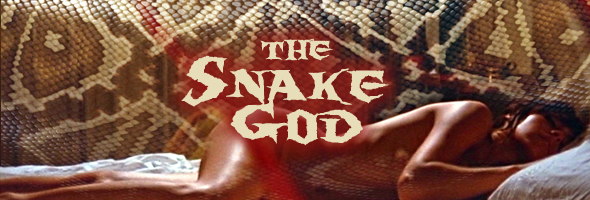
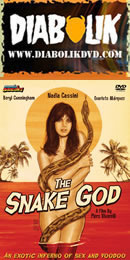

Color, 1970, 95m.
Directed by Piero Vivarelli
Starring Beryl Cunningham, Nadia Cassini, Evaristo Márquez, Sergio Tramonti, Galeazzo Benti
Mondo Macabro (DVD) (US R0 NTSC), Storm (Italy R2 PAL) / WS (2.35:1) (16:9)
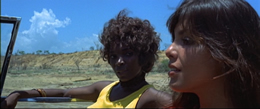
Better known today in cult circles for its spectacular, frequently
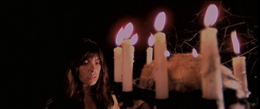 reissued soundtrack than as an actual movie, The Snake God (Italian title: Il dio serpente) is one of the earliest and most interesting entries in the tropical erotic cycle popular in Europe in the '70s, which culminated in a wave of titles from Joe D'Amato like Papaya: Love Goddess of the Cannibals. All the major ingredients are here: a susceptible married white woman, voodoo rituals, percussive music, and of course, plenty of natives well versed in the ways of ancient magic and the sexual arts. That formula isn't exactly politically correct today, but this particular film takes a somewhat different approach by siding entirely with the locals and offering no consequences whatsoever for the heroine's personal awakening.
reissued soundtrack than as an actual movie, The Snake God (Italian title: Il dio serpente) is one of the earliest and most interesting entries in the tropical erotic cycle popular in Europe in the '70s, which culminated in a wave of titles from Joe D'Amato like Papaya: Love Goddess of the Cannibals. All the major ingredients are here: a susceptible married white woman, voodoo rituals, percussive music, and of course, plenty of natives well versed in the ways of ancient magic and the sexual arts. That formula isn't exactly politically correct today, but this particular film takes a somewhat different approach by siding entirely with the locals and offering no consequences whatsoever for the heroine's personal awakening. Fresh off the boat at a sunny Caribbean island, Paola (Starcrash's Cassini) enjoys spending her days sunbathing, downing J&B, and spending time with her much older husband, Bernard (Tramonti), with whom she spends one afternoon on a boat using binoculars to spy on a local couple making love in the surf. The female half of that pair turns out to be Stella (Cunningham), with whom she bonds thanks to conversations like "He's a nice guy but a bit stupid, like all Capricorns with Saturn rising." Stella gets an itch to check out a nearby area called Black Rock and ignores warnings about sharks and other perils, only to encounter a huge snake when she actually sneaks over there. Stella informs her that it wasn't really a snake but Djamballa, a god worshipped by the island's voodoo religion who hold wild,
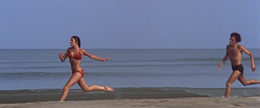 sexualized rites at night. Now that Djamballa has set his sights on Stella, she has to go see the head witch doctor, setting off an awakening that will change her forever.
sexualized rites at night. Now that Djamballa has set his sights on Stella, she has to go see the head witch doctor, setting off an awakening that will change her forever. Lensed in Colombia and Venezuela, this was a highly successful film at the time for director Piero Vivarelli who made this the first installment of an "exotic erotic" trilogy alongside The Black Decameron and the obscure Codice d'amore orientale (both of which also boast spectacular soundtracks). Best known at the time as the director of Satanik and a co-writer on Django, he was already something of a political iconoclast with far left leanings, and that attitude prevails here as manages to inject what would normally be yet another interracial potboiler with a genuinely subversive edge at times. This is especially obvious in the final five minutes, easily the film's final moment, which finally cranks out the memorable "Djamballa" theme in full as Paola finally chooses her poetic but wisely ambiguous destiny.
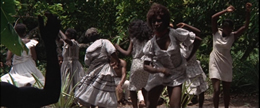
Barely released outside of Italy, The Snake God received a DVD release in its native country in 2006 in a solid anamorphic transfer with no English-friendly options. That one went out of circulation fairly quickly, paving the way for a surprising but very welcome 2013 American edition from Mondo Macabro (who really seem to have a thing for snake-themed movies). The transfer appears to be from the same source but features better compression, and since an HD bump for this title seems highly unlikely in the near future,
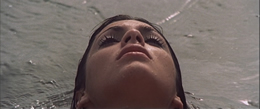 this is more than satisfying. The warm colors look great, the framing appears to be accurate, and the English subtitles are both accurate and often marvelously quotable.
this is more than satisfying. The warm colors look great, the framing appears to be accurate, and the English subtitles are both accurate and often marvelously quotable. In addition to the Italian trailer (which contains numerous alternate shots) and the usual Mondo Macabro promo reel, the disc features a fantastic 2010 interview with the late Vivarelli (14 mins.) in which he proudly brands himself a genre director, says he became a movie fan as a kid so he could marry a movie star like Shirley Temple, discusses his deeply linked passions for music and film, recalls his awakening to communism in Cuba while hanging out with Che Guevara, reminisces about working with Lucio Fulci, and reveals the best places in the world to score some prime ganja. In the funniest moment, he also explains how he likes the idea of showing unsimulated sex in movies but says he hates the films of Catherine Breillat: "you see some sex but it's all so intellectual it's a pain in the arse." A very thorough written overview of the film is included as well along with profiles for Cassini, Cunningham (including her brief disco music career), and Vivarelli. All in all, a terrific presentation of a wild little number bound to take a lot of English-speaking newcomers by surprise.
Reviewed on December 5, 2013.
![]()